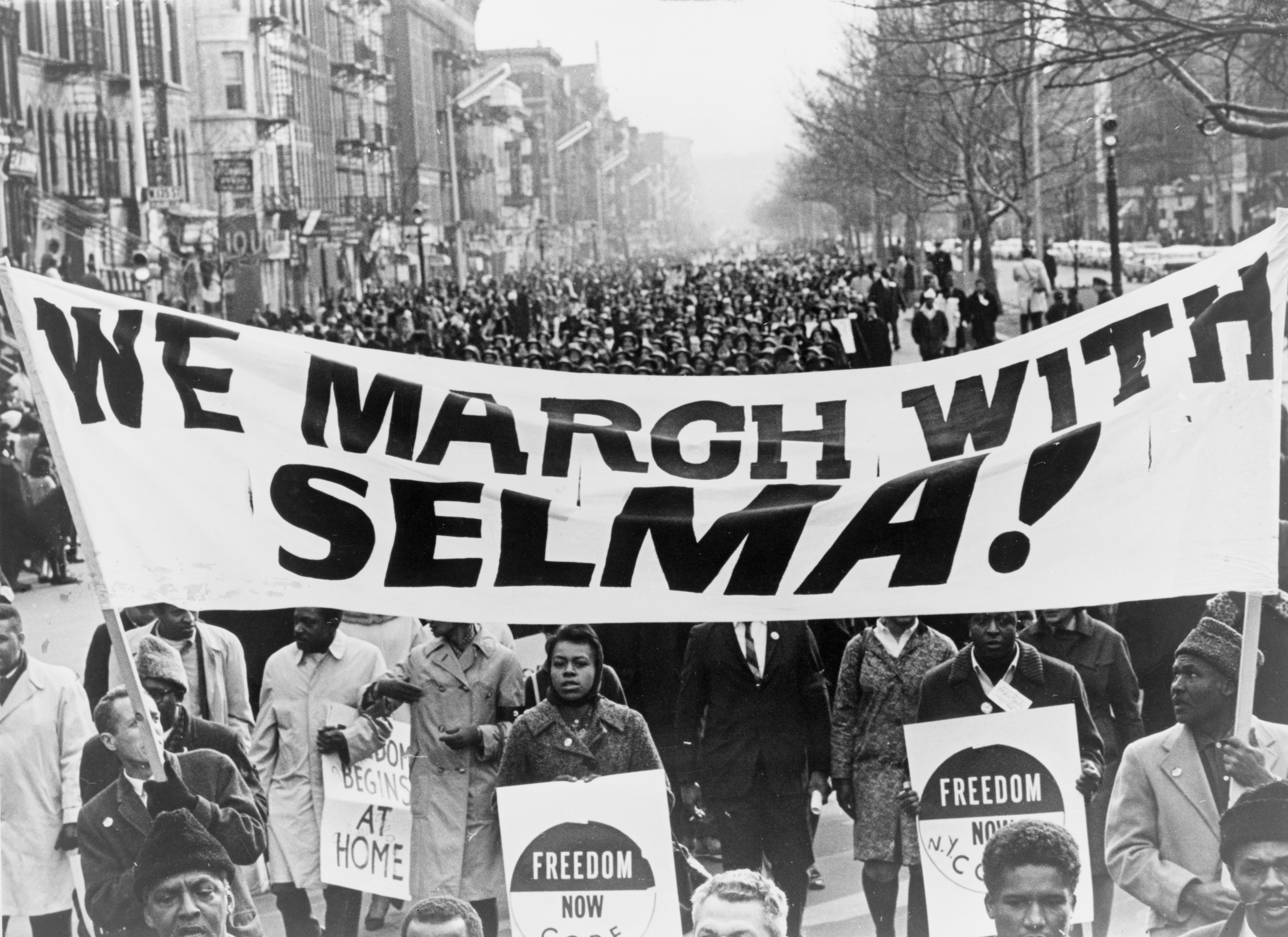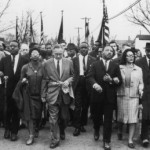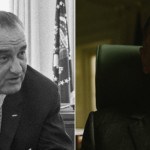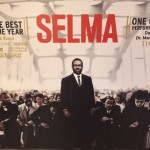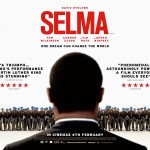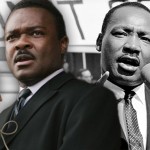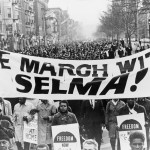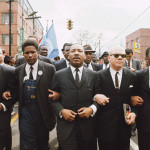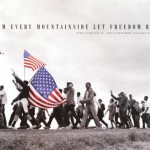Selma is the sort of biopic, made with reverential conviction where you expect to see the name of Oprah Winfrey among producers and cast, and sure enough – there she is (along with a certain executive producer named Brad Pitt.) The prescence of Ms Winfrey might catalogue Selma as being a “worthy” and po-faced neoliberal project, the one criticism routinely levelled at several of Spielberg‘s more serious movies (Schindler’s List, for example)… so it will not be any surprise that Spielberg indirectly influenced this movie by virtue of planning one of his own. From Wikipedia:
In July 2013, it was announced that Ava DuVernay had signed on to direct the film for Pathé UK and Plan B, and that she was revising the script with the original screenwriter, Paul Webb. DuVernay estimated that she re-wrote 90 percent of Webb’s original script. Those revisions included rewriting King’s speeches, because, in 2009, King’s estate licensed them to DreamWorks Pictures and Warner Bros. for an untitled project to be produced by Steven Spielberg. Subsequent negotiations between those companies and Selma‘s producers did not lead to an agreement. DuVernay drafted alternative speeches that evoke the historic ones without violating the copyright. She recalled spending hours listening to King’s words while hiking the canyons of Los Angeles. While she did not think she would “get anywhere close to just the beauty and that nuance of his speech patterns”, she did identify some of King’s basic structure, such as a tendency to speak in triplets (saying one thing in three different ways)
It might seem absurd that the director should have to rewrite the words of the great man for legal reasons, but it did not stop the project – and truth be told, she did a pretty damn good job of speechwriting for MLK, unnecessary as it might seem. I wish Spielberg had been more magnanimous and King could speak the words of King.
Next question I need to ask is what Selma is actually about. Sure, it a film depicting a seminal moment in the history of the American Civil Rights movement, one which prompted a change in the law to prevent black citizens being registered to vote, and therefore to make sure the black voice was heard. It portrays the lead up to and execution of marches, yet they are not the nub of this movie.
While King’s passionate, if not authentic, speeches stir up a participative frenzy, to a greater degree the movie is much more about the behind-the-scenes political machinations that enable the marches – and eventually the change in voting to take place, and the tensions that lie therein.
The triumvirate in the decision making process are King (who seems to have had pretty free access to the White House, despite turning down repeated requests from President Johnson to be a part of the government), Johnson himself and Canute turning back the tide in the form of Governor George Wallace, here cast as the villain of the piece and tacit defender of the racist culture in Alabama – though actually a many time Democratic Presidential candidate himself. Some of the complexities of policy making are greatly simplified, and complex characters portrayed in very black-and-white terms – which you might consider apt in view of the subject matter.
Here’s one small curiosity about : most of the leading players are British, including David Oyelowo‘s Martin Luther King and Tom Wilkinson‘s Lyndon B Johnson, at once allies and adversaries; Wallace is played by the very same British actor Tim Roth who you may remember in Pulp Fiction and Reservoir Dogs, among others; and Coretta Scott King is nimbly played by Carmen Ejogo, the fourth British star.
Maybe it’s a deliberate irony on the part of director Ava DuVernay, or simply a reflection of the fact that British character actors are the best in the business, but there’s no doubting that it works a treat. Each commands the set, seems entirely authoritative in their roles and would not be taken for any other than the characters they portray.
Oyelowo’s King is cautious and meticulous, more subtle than his press might have indicated, yet the master of oratory, moving from quiet and rational openings to full-lunged rhetoric, demonstrating the charisma that made King stand out from the crowds. The essence of the man was arguably more important than the physical resemblance, but credit to Oyelowo for capturing both the impersonation and man within.
Wilkinson is an actor who always goes about his business with quiet intensity, and here those qualities were never better employed. Not the most obvious to be cast at Johnson but he captures the vote-winning pragmatic Texan hustler to a tee. Ever the Machiavellian schemer, Wilkinson’s President is concerned about trade-offs in order to get his way, knowing which battles to fight when. In this case, saying yes to King would create a heap of bigger problems, not least to his flagship war on poverty, for which he is doing deals to get the bills through Congress. At this point, he does not need the distraction of another southern racial war, still less the murder of innocents by the KKK and their redneck cronies.
The remainder of the cast are uniformly excellent, including cameos for Winfrey, Cuba Gooding Jr and Martin Sheen, though it becomes, as it should be, a who’s who of well known characters rather than actors: Malcolm X, Mahalia Jackson, Ralph Abernathy, Archbishop Iakavos, J Edgar Hoover and many more for students of 60s history to spot.
The critics liked it though (see bottom), though given the credentials, fine production values and powerful performances you might be justified in asking why it scored only one Oscar – and that being for its title song, Glory (by Common, who also plays James Bevel, and John Legend.) Should it not have won the big prizes rather than 12 Years A Slave, Gravity and Dallas Buyers Club?
Probably not. It does not build momentum or exploit the quality of the raw materials as perhaps it should. For all the fact that this is a two-hour movie the conclusion peters out and fails to live up to the promised pinnacles of dramatic tension. A couple of weak scenes towards the end lose the thrust of the narrative – a pity.
A King speech in the last section gives on-screen tells you what happened to some of the key characters, but there is no sense of fulfilment at the climax, that they marching and murders delivered a key result. Perhaps this is where the involvement of Spielberg might have paid dividends, he being the king of the emotive ending, perhaps over keen on ladling schmaltz but nonetheless able to milk the drama to its denouement.
Nevertheless, there is a great deal to enjoy here, and certainly not a whitewashed hagiography. The well-known story of Dr King’s frequent sexual affairs is included, from the perspective of Hoover ensuring Coretta is informed, and therefore to keep King well away from the marching season. Needless to say, it didn’t work for long.
My conclusion? A good film, but not a great one. Were I awarding stars it might be 7 out of 10, but not quite up there with the best. Next question: how will Spielberg’s surely inevitable biopic of King turn out, and who will play the great man next?
Selma received critical acclaim from critics, particularly for its acting and direction. On Rotten Tomatoes, the film holds a rating of 99%, based on 210 reviews, with an average rating of 8.7/10. The site’s critical consensus reads: “Fueled by a gripping performance from David Oyelowo, Selma draws inspiration and dramatic power from the life and death of Martin Luther King, Jr. — but doesn’t ignore how far we remain from the ideals his work embodied.” On Metacritic, the film has a score of 89 out of 100, based on 46 critics, indicating “universal acclaim”. According to CinemaScore, audiences gave the film a rare grade of “A+” on an A+ to F scale. Richard Roeper of the Chicago Sun Times praised the film as “an important history lesson that never feels like a lecture. Once school is back in session, every junior high school class in America should take a field trip to see this movie.” Joe Morgenstern, writing for The Wall Street Journal, wrote: “At its best, Ava DuVernay’s biographical film honors Dr. King’s legacy by dramatizing the racist brutality that spurred him and his colleagues to action.” A. O. Scott of The New York Times praised the acting, directing, writing, and cinematography, and wrote: “Even if you think you know what’s coming, Selma hums with suspense and surprise. Packed with incident and overflowing with fascinating characters, it is a triumph of efficient, emphatic cinematic storytelling.” Peter Travers of Rolling Stone wrote: “DuVernay’s look at Martin Luther King’s 1965 voting-rights march against racial injustice stings with relevance to the here and now. Oyelowo’s stirring, soulful performance as King deserves superlatives.” David Denby, writing for The New Yorker, wrote: “This is cinema, more rhetorical, spectacular, and stirring than cable-TV drama.” Ann Hornaday of The Washington Post gave the film four out of five stars, and wrote: “With Selma, director Ava DuVernay has created a stirring, often thrilling, uncannily timely drama that works on several levels at once … she presents [Martin Luther King, Jr.] as a dynamic figure of human-scale contradictions, flaws and supremely shrewd political skills.”

